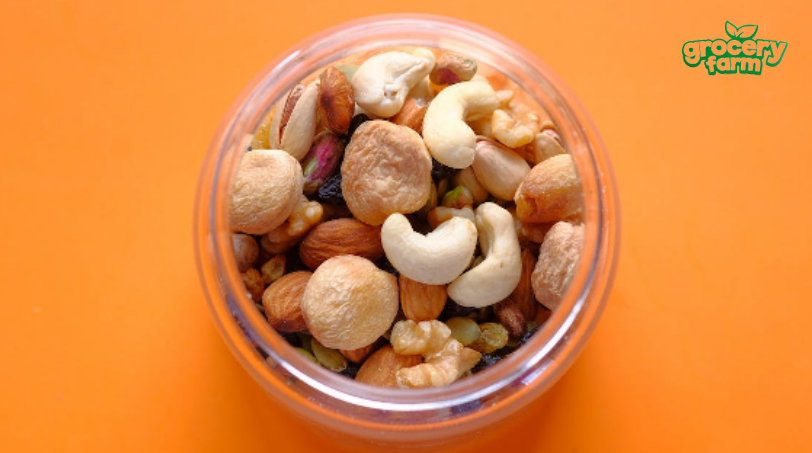The beginning of winter is exciting because we enjoy the sun's warm beams in chilly mornings and celebrate the year's conclusion with festive delights. Winter, however, also has its problems. This time of year has abrupt weather changes, a dry atmosphere, and an increase in coughs and colds. You can avoid the cold weather's illnesses by including healthy items in your diet. Your winter diet may benefit notably from having dried fruits.
What are some of the dry fruits?
Dry fruits are, as their name suggests, some fruits, including figs, apricots, and grapes that have been dried out. All nuts, such as almonds, walnuts, cashews, and pistachios, are also considered dry fruits.
For our bodies, dry fruits are excellent suppliers of healthy fat and other nutrients. They are excellent choices for snacks. One of the best things to eat in the winter is dry fruits, which also improve your health.

The benefits of including dry fruits in your wintertime diet are:
1. Continues to feed your skin with nourishment:
The dryness of winter causes your body to become dehydrated. Your skin excessively drying out is one of the repercussions of severe dryness. You can have dehydrated skin, cracked heels, and chapped lips on your hands and legs. Natural oils found in dry fruits help your skin naturally retain moisture. As a result, the skin maintains its suppleness. Dry fruits like almonds, walnuts, prunes, and raisins aid in the body's detoxification process and promote healthy skin. Walnuts are one of the best dry fruits for the skin since they are high in vitamin B and omega-3 fatty acids and beneficial oils. These substances assist your skin's texture and fight wrinkles.

2. Aids in weight control
During the winter, we frequently splurge on fatty foods that we cannot enjoy in the summer. Decadent spreads around the holidays may throw your diet and weight loss goals out the window. By eating dry fruits this winter, you may counterbalance your excesses. You can feel whole and even lose weight by nibbling on dry fruits, which are a highly healthy choice. Due to their high fibre content, dry fruits maintain a healthy digestive system, which is crucial for weight loss. Dry fruits also prevent overeating and bloating yourself by squelching your hunger pains.

3. Daily nutritional intake
Dry fruits are easy to eat on the go and have 3.5 times more fibre, minerals, and nutrients than fresh fruit. You can benefit greatly from adding a small number of dried fruits to your diet during the winter. You can get most of the nutrients you need daily from a combination of dry fruits.
4. Immunity Booster
Winter may be challenging due to the increased prevalence of illnesses like the common cold and cough. Maintaining immunity to the growing list of diseases is crucial, particularly as the season's change and winter approaches. One of the best foods for boosting immunity is dry fruit. They are chock full of antioxidants and vitamin C, which help strengthen immunity. Figs, raisins, and apricots are just a few examples of dry fruits that are excellent providers of vitamin C, which supports your body's immunity. All types of dry fruits are rich in antioxidants, which help the body's immune system. As a result, including dry fruits in your diet during the winter can be a surefire strategy to increase your body's resilience to illnesses.
5. Maintains body temperature - Vitamin E is a natural body
warmer
Throughout this winter, dried fruits can help you stay warm. Due to their high-fat content, dry fruits naturally produce heat within the body. Dry fruits also aid in lowering your body's harmful cholesterol levels. You may easily incorporate these natural body warmers into your diet to help you wear fewer layers of clothing during the cold.
6. Maintains intense energy levels
One of the most challenging winter activities is getting out of bed on a frigid winter morning. Dry fruits might help you give yourself a boost of energy for the day and get rid of your tiredness. Eat a small bowl of mixed dry fruits every morning to energize yourself all day. Protein and antioxidants found in nuts help you stay energized. You can focus better on your work and maintain overall brain health by eating dry fruits daily.
7. Balance Sugar levels with Dates
When you chew on a handful of dates, which are naturally rich in sucrose, fructose, and glucose, you experience an immediate energy boost. Due to this, many athletes sip date juice during games to rapidly reenergize themselves without breaking any rules or regulations. It would be a relief for people with diabetes to learn that dates have a low glycemic index. As a result, eating them does not cause a surge in blood sugar. Dates are a great way to improve digestive health since they are high in iron and potassium, which is especially helpful for people prone to diarrhoea in the winter. However, regular consumption of prunes helps those who from constipation.

In conclusion, eat many dry fruits to stay healthy this winter. Dry fruits, such as almonds, raisins, cashews, figs, and walnuts, are rich in nutrients and prevent illness in the winter. They also maintain your skin's natural moisture levels. With the aid of dried fruits, you may enjoy the brisk winter weather without worrying about your health.

